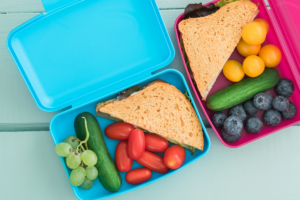
Providing children with well-balanced and nutritious meals is crucial for their growth, development, and overall well-being. As parents and caregivers, it’s essential to understand the importance of creating a nutritional foundation for our children. Having a wholesome and balanced diet is an essential part of healthy child growth. Our providers at HealthPark Pediatrics are here to consult our patients with their nutritional needs. Here are five effective ways to build nutritional meals that support their health and vitality.
Ways to Build Nutritional Meals for Children
1. Include a Variety of Food Groups:
A well-rounded meal should incorporate foods from all the major food groups to ensure children receive a broad spectrum of nutrients. These food groups include fruits, vegetables, grains, protein, and dairy. Each group offers unique vitamins and minerals vital for different aspects of growth and development.
- Fruits and Vegetables: These are rich in vitamins, minerals, and fiber. Aim for a colorful array on your child’s plate, as different colors signify different nutrients. Incorporate fruits and veggies in various forms – fresh, frozen, or as 100% pure juices.
- Grains: Choose whole grains over refined ones. Whole grains such as brown rice, quinoa, and whole wheat bread provide essential fiber and nutrients for sustained energy.
- Protein: Include lean protein sources like poultry, fish, eggs, beans, and nuts. Protein is essential for muscle development and overall body function.
- Dairy: Opt for low-fat or fat-free dairy products for a good source of calcium and vitamin D, crucial for bone health.
2. Plan Balanced Meals and Snacks:
Establishing a routine for meals and snacks is essential to prevent overeating and ensure a steady supply of energy throughout the day. Plan meals that include a combination of protein, healthy fats, and carbohydrates. Offer nutrient-dense snacks like fruits, yogurt, or nuts to keep hunger at bay between meals.
- Breakfast: Considered the most important meal of the day, a healthy breakfast kickstarts metabolism and helps children stay focused in school. Include whole grains, protein, and fruits in breakfast options.
- Lunch and Dinner: Build meals around a protein source, whole grains, and plenty of vegetables. Limit processed and sugary foods while emphasizing homemade, balanced meals.
- Snacks: Choose snacks that provide nutritional value. Fresh fruits, vegetables with hummus, or yogurt with nuts are excellent choices.
3. Get Creative with Presentation:
Children are often more receptive to nutritious meals when they look appealing. Get creative with how you present food to make it visually appealing and enjoyable. Use cookie cutters to shape sandwiches, arrange fruits in colorful patterns, or create a veggie rainbow on their plate. Making meals visually appealing can entice children to try new foods and appreciate the importance of a balanced diet.
4. Involve Children in Meal Preparation:
Engage your children in the process of meal preparation to foster a positive relationship with food. Let them choose fruits and vegetables at the grocery store, involve them in simple cooking tasks, and encourage them to be hands-on in the kitchen. When children have a role in preparing their meals, they become more invested in the process and are likely to develop healthier eating habits.
5. Limit Added Sugars and Processed Foods:
Excessive consumption of added sugars and processed foods can have detrimental effects on children’s health. These foods often lack essential nutrients and contribute to weight-related issues. Be mindful of labels and limit foods and beverages high in added sugars. Instead, focus on whole, natural foods that provide a wealth of nutrients without unnecessary additives.
Speak to a Pediatrician
Building a nutritional foundation for children involves a combination of thoughtful planning, creativity, and education. By incorporating a variety of food groups, planning balanced meals and snacks, presenting food in an appealing manner, involving children in meal preparation, and limiting added sugars and processed foods, we can ensure our children receive the nutrients they need for optimal growth and development. Remember, instilling healthy eating habits in childhood sets the stage for a lifetime of well-being. Contact us at 919.896.7066 to learn more.



